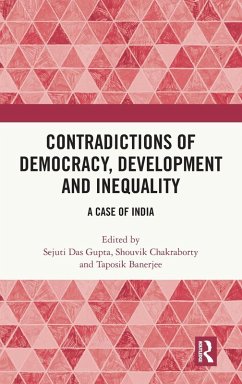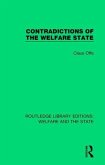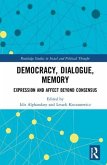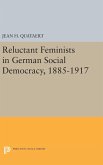Contradictions of Democracy, Development and Inequality
A Case of India
Herausgeber: Das Gupta, Sejuti; Banerjee, Taposik; Chakraborty, Shouvik
Contradictions of Democracy, Development and Inequality
A Case of India
Herausgeber: Das Gupta, Sejuti; Banerjee, Taposik; Chakraborty, Shouvik
- Gebundenes Buch
- Merkliste
- Auf die Merkliste
- Bewerten Bewerten
- Teilen
- Produkt teilen
- Produkterinnerung
- Produkterinnerung
Identity politics has widened representation for the marginalised groups in democracies, while neoliberalism has deepened inequality. This volume finds answers to the paradox of widening representation and worsening inequality especially in India exploring the themes of development and identity in recent times.
Andere Kunden interessierten sich auch für
![Contradictions of Archaeological Theory Contradictions of Archaeological Theory]() Sandra WallaceContradictions of Archaeological Theory186,99 €
Sandra WallaceContradictions of Archaeological Theory186,99 €![Contradictions of the Welfare State Contradictions of the Welfare State]() Claus OffeContradictions of the Welfare State150,99 €
Claus OffeContradictions of the Welfare State150,99 €![Contradictions of Capitalist Society and Culture Contradictions of Capitalist Society and Culture]() Raju J DasContradictions of Capitalist Society and Culture135,99 €
Raju J DasContradictions of Capitalist Society and Culture135,99 €![The Contradictions of Love The Contradictions of Love]() Lena GunnarssonThe Contradictions of Love176,99 €
Lena GunnarssonThe Contradictions of Love176,99 €![Democracy, Dialogue, Memory Democracy, Dialogue, Memory]() Democracy, Dialogue, Memory178,99 €
Democracy, Dialogue, Memory178,99 €![Frankfurt School Perspectives on Globalization, Democracy, and the Law Frankfurt School Perspectives on Globalization, Democracy, and the Law]() William E. ScheuermanFrankfurt School Perspectives on Globalization, Democracy, and the Law176,99 €
William E. ScheuermanFrankfurt School Perspectives on Globalization, Democracy, and the Law176,99 €![Reluctant Feminists in German Social Democracy, 1885-1917 Reluctant Feminists in German Social Democracy, 1885-1917]() Jean H. QuataertReluctant Feminists in German Social Democracy, 1885-191791,99 €
Jean H. QuataertReluctant Feminists in German Social Democracy, 1885-191791,99 €-
-
-
Identity politics has widened representation for the marginalised groups in democracies, while neoliberalism has deepened inequality. This volume finds answers to the paradox of widening representation and worsening inequality especially in India exploring the themes of development and identity in recent times.
Produktdetails
- Produktdetails
- Verlag: Routledge India
- Seitenzahl: 286
- Erscheinungstermin: 23. Juli 2025
- Englisch
- Abmessung: 240mm x 161mm x 20mm
- Gewicht: 596g
- ISBN-13: 9781032291888
- ISBN-10: 1032291885
- Artikelnr.: 73328008
- Herstellerkennzeichnung
- Libri GmbH
- Europaallee 1
- 36244 Bad Hersfeld
- gpsr@libri.de
- Verlag: Routledge India
- Seitenzahl: 286
- Erscheinungstermin: 23. Juli 2025
- Englisch
- Abmessung: 240mm x 161mm x 20mm
- Gewicht: 596g
- ISBN-13: 9781032291888
- ISBN-10: 1032291885
- Artikelnr.: 73328008
- Herstellerkennzeichnung
- Libri GmbH
- Europaallee 1
- 36244 Bad Hersfeld
- gpsr@libri.de
Sejuti Das Gupta is an Associate professor at the Michigan State University, USA. She has also taught at the Tata Institute of Social Sciences, India. Her research is interdisciplinary and based on primary data and aims to contribute towards combining theory and practice for a better understanding in social science. Her most recent publication is called, Class, Politics and Agrarian Policies in Post-liberalisation India (2024). Shouvik Chakraborty is an Assistant Research Professor at the Political Economy Research Institute (PERI) at the University of Massachusetts Amherst, USA. He specializes in environmental and energy economics, climate finance, job creation, and macroeconomics and is committed to addressing the urgent challenges posed by climate change. His recent research projects include analyzing the employment effects of President Biden's initiatives in green energy, manufacturing, and infrastructure in the United States. Taposik Banerjee teaches Economics at the School of Liberal Studies, Dr. B. R. Ambedkar University Delhi, India. His research interests include social choice, law and economics and network theory. His recently published work is 'Characterization of a k-th best element rationalizable choice function with full domain', in the journal, Theory and Decision.
PART I Democracy 1. Recognition or Redistribution? Marxism and the National
Question 2. Democracy, Subaltern Social Class and the Rise of Neoliberal
Era 3. Is 'Recognition' an End in Itself? The Case of New State Formation
in Chhattisgarh and Jharkhand PART II Development and Inequality 4. The
Political Economy of Social Reproduction and Capital Accumulation in
Post-independent India 5. Neoliberalism and Women's Work: A Study of the
Informal Economy in India 6. Does Inequality Augment Employment Growth?
Revisiting Marx, Kalecki and Kaldor in the Indian Context 7. The Informal
Sector in India: Neo-dualism and Dual Policy Response PART III Natural
Resource and Development 8. For Food and Livelihood: Rethinking the Role of
Agriculture in India's Capitalist Development 9. Climate Change and
Livestock Holding: Inequalities in Adaptation and the Need for Localised
Policies 10. Right to Water, Privatisation and the Issue of Efficiency 11.
Agriculture as a Source of Livelihood in Urban and Peri-Urban Areas: A Case
of India after 2000 PART IV Identity Politics and Democracy 12. Muslims in
New India: Some Preliminary Observations 13. Understanding the
Postcolonial: Native versus Settlers and Brahmin versus Dalit 14.
Mool-Niwasis or Khilonjias? Indigeneity, Hindutva and the Quest for
Scheduled Tribe Status by Adivasis in Assam
Question 2. Democracy, Subaltern Social Class and the Rise of Neoliberal
Era 3. Is 'Recognition' an End in Itself? The Case of New State Formation
in Chhattisgarh and Jharkhand PART II Development and Inequality 4. The
Political Economy of Social Reproduction and Capital Accumulation in
Post-independent India 5. Neoliberalism and Women's Work: A Study of the
Informal Economy in India 6. Does Inequality Augment Employment Growth?
Revisiting Marx, Kalecki and Kaldor in the Indian Context 7. The Informal
Sector in India: Neo-dualism and Dual Policy Response PART III Natural
Resource and Development 8. For Food and Livelihood: Rethinking the Role of
Agriculture in India's Capitalist Development 9. Climate Change and
Livestock Holding: Inequalities in Adaptation and the Need for Localised
Policies 10. Right to Water, Privatisation and the Issue of Efficiency 11.
Agriculture as a Source of Livelihood in Urban and Peri-Urban Areas: A Case
of India after 2000 PART IV Identity Politics and Democracy 12. Muslims in
New India: Some Preliminary Observations 13. Understanding the
Postcolonial: Native versus Settlers and Brahmin versus Dalit 14.
Mool-Niwasis or Khilonjias? Indigeneity, Hindutva and the Quest for
Scheduled Tribe Status by Adivasis in Assam
PART I Democracy 1. Recognition or Redistribution? Marxism and the National
Question 2. Democracy, Subaltern Social Class and the Rise of Neoliberal
Era 3. Is 'Recognition' an End in Itself? The Case of New State Formation
in Chhattisgarh and Jharkhand PART II Development and Inequality 4. The
Political Economy of Social Reproduction and Capital Accumulation in
Post-independent India 5. Neoliberalism and Women's Work: A Study of the
Informal Economy in India 6. Does Inequality Augment Employment Growth?
Revisiting Marx, Kalecki and Kaldor in the Indian Context 7. The Informal
Sector in India: Neo-dualism and Dual Policy Response PART III Natural
Resource and Development 8. For Food and Livelihood: Rethinking the Role of
Agriculture in India's Capitalist Development 9. Climate Change and
Livestock Holding: Inequalities in Adaptation and the Need for Localised
Policies 10. Right to Water, Privatisation and the Issue of Efficiency 11.
Agriculture as a Source of Livelihood in Urban and Peri-Urban Areas: A Case
of India after 2000 PART IV Identity Politics and Democracy 12. Muslims in
New India: Some Preliminary Observations 13. Understanding the
Postcolonial: Native versus Settlers and Brahmin versus Dalit 14.
Mool-Niwasis or Khilonjias? Indigeneity, Hindutva and the Quest for
Scheduled Tribe Status by Adivasis in Assam
Question 2. Democracy, Subaltern Social Class and the Rise of Neoliberal
Era 3. Is 'Recognition' an End in Itself? The Case of New State Formation
in Chhattisgarh and Jharkhand PART II Development and Inequality 4. The
Political Economy of Social Reproduction and Capital Accumulation in
Post-independent India 5. Neoliberalism and Women's Work: A Study of the
Informal Economy in India 6. Does Inequality Augment Employment Growth?
Revisiting Marx, Kalecki and Kaldor in the Indian Context 7. The Informal
Sector in India: Neo-dualism and Dual Policy Response PART III Natural
Resource and Development 8. For Food and Livelihood: Rethinking the Role of
Agriculture in India's Capitalist Development 9. Climate Change and
Livestock Holding: Inequalities in Adaptation and the Need for Localised
Policies 10. Right to Water, Privatisation and the Issue of Efficiency 11.
Agriculture as a Source of Livelihood in Urban and Peri-Urban Areas: A Case
of India after 2000 PART IV Identity Politics and Democracy 12. Muslims in
New India: Some Preliminary Observations 13. Understanding the
Postcolonial: Native versus Settlers and Brahmin versus Dalit 14.
Mool-Niwasis or Khilonjias? Indigeneity, Hindutva and the Quest for
Scheduled Tribe Status by Adivasis in Assam








